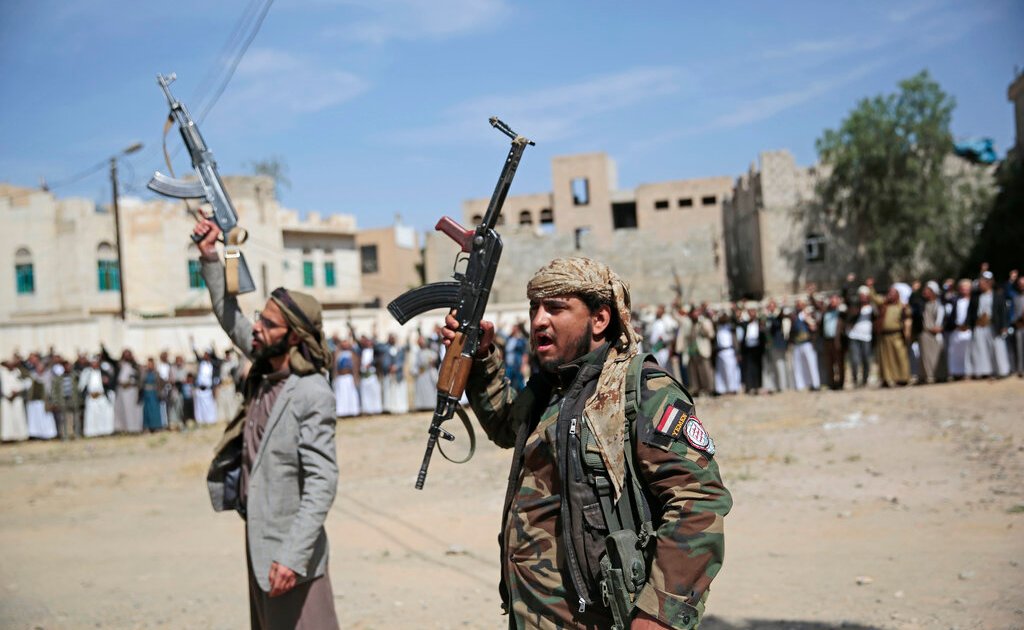The limits of Iran’s influence on Yemen’s Houthi rebels

While Iran engages in dialogue with regional rivals Saudi Arabia and the UAE, its ally in Yemen has increased attacks on them.
Houthi rebels continue to attack airports and oil facilities in Saudi Arabia, but a new target recently came into focus.
The armed group had largely spared the other prominent actor in Yemen – the United Arab Emirates – since the UAE reduced its direct military involvement there in 2019.
Troops loyal to the UAE long avoided a direct confrontation with the Houthis, but that changed after Emirati-backed fighters from southern Yemen pushed the rebels out of the oil-rich area around the city of Shabwah in early January.
About 150km (70 miles) northwest, these soldiers were also involved in battles for the province of Marib at the same time.
For the Houthis, the attacks were pivotal setbacks since Shabwah and Marib’s energy and mineral resources would make a Houthi-led state in Yemen economically viable.
Analysts suggest the events likely explain why the Iran-aligned Houthis abandoned their undeclared ceasefire with the UAE and made it a target.
The Houthis launched a series of drone and rocket attacks on the UAE in recent weeks, including during a visit by Israeli President Isaac Herzog at the end of January. Three guest workers were killed in Houthi attacks on January 17.
The UN Security Council condemned the “heinous terrorist attacks” on the UAE as well as on Saudi Arabia in January.
The question has arisen: Where does Iran – which over the past year has engaged with regional rivals – stand on the Houthi attacks on the UAE?
‘Axis of resistance’
Iran has said it supports the Houthis politically, but denies sending the group weapons.
The Houthis rose up against the Yemeni government in 2014 and triggered the ongoing civil war on the southern tip of the Gulf Peninsula. The Saudi Arabia-led military alliance joined the fight a year later.
Iran, which considers the Houthis part of an “axis of resistance” against Israel and the United States, holds sway over Lebanon’s Hezbollah, militias in Iraq, and the Syrian armed forces of President Bashar al-Assad.
However, the Houthis differ from Iran’s other partners, Stephen Zunes, professor of politics and international studies at the University of San Francisco, told Al Jazeera.
“Unlike some allied militia in Iraq and Syria, the Houthis have never been an Iranian proxy. They have their own unique history, grievances and agenda,” said Zunes.
While the US and others have accused Iran of supplying the Houthis with rocket and drone technology that has allowed them to attack far beyond Yemen’s borders, it is unclear whether that is 100 percent accurate, analysts say.
“The vast majority of their weapons have been captured or purchased on the black market and are not of Iranian origin,” Zunes said.
Moreover, the Houthis are less tied to Tehran than Hezbollah members, and they are not under the Iranian command and control system and act largely autonomously, said Trita Parsi, executive vice president of the Quincy Institute for Responsible Statecraft.
“Over the years, Tehran has been able to deepen its relations with the Houthis. However, its influence over the group has always been limited. The Houthis welcome Iranian support, but they do not take orders from Tehran,” Parsi told Al Jazeera.
The war was the only reason Iran was able to gain influence in the first place, he added.
“Had the Saudis not invaded, Tehran would not even have been able to deepen its relations with the Yemeni group,” Parsi said.
“Contrary to the Saudi narrative, Iran’s relations with the Houthis are a very recent phenomenon and a direct consequence of the Saudi invasion of the country. Moreover, prior to 2010, the Saudis – who used to work closely with the Houthis – did not even refer to the group as Shia,” said Parsi.
‘Hardly Iranian puppets’
Iran’s relations with the UAE have improved after a dialogue process mediated by Iraq that also includes Saudi Arabia. Tehran and Abu Dhabi have continued their rapprochement despite the Gulf state’s recent move to enhance diplomatic relations with Israel.
It is therefore difficult to imagine that Tehran is directing Houthi attacks or even giving the green light. Iran has, at least publicly, advocated in favour of a diplomatic solution in Yemen.
“There are quite a few justifiable criticisms of the Houthis, but they are hardly Iranian puppets,” said Zunes. “Washington is using such labels largely to rationalise for US support of the genocidal bombing campaign by the Saudis and the UAE.”
Parsi suggested the influence of Tehran over the Houthis is only likely to decrease if the Saudis and Emiratis “end the war”.
Fighting continues to rage in Yemen and it remains uncertain when a political solution can be found after 11 years of grinding war, creating what the United Nations calls the world’s worst humanitarian disaster.
Yemenis are quite capable of settling differences among themselves if foreigners did not keep intervening militarily, Zunes said.
“The best solution [for peace] would be to form a broad provisional coalition government and move forward to free and fair multiparty elections,” said Zunes.
“Back in 2011, there was an impressive degree of unity among the various tribal, regional, sectarian, and ideological groups that took part in the pro-democracy protests against the Saleh regime, which included mass marches, sit-ins, and many other forms of nonviolent civil resistance.”






